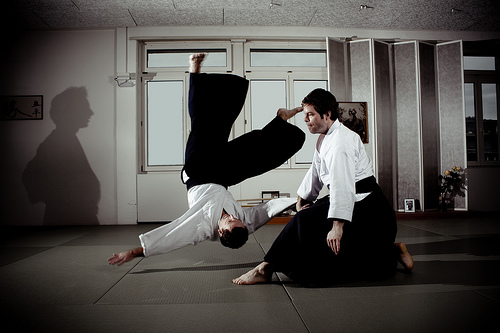(image source: Daniele Oberti via Compfight)
When paying for a language course (with your time, effort or money) there’s one mistake you should probably avoid – treating your language study like it’s something static. Let’s take a look at what moves when languages are learned.
Unwelcome rituals: the anatomy of a reluctant language learner (Case Study 1)
The Russian course you signed up for turns out to be a nightmare. Twice a week, you turn up for your classes. Every few months, a test comes along. And since Russian is needed for your business – it gets used at work.
You don’t really enjoy any of it. The Cyrillic alphabet has lost its pizzazz. The melody of the language, so new and romantic once, is now just a ringing in your ears.
Here’s something you won’t hear from me again:
You’re still learning. You’re going through the motions. There are many more learners like you. And what you’re doing is better than nothing.
“Would if I could” – the platonic love of language (Case Study 2)
Gaelic is the stuff of your dreams, the bulk of your playlist, the amazing ideal you aspire to. You can list all your favourite singers and the reasons why it would be so great to learn the language one day. You even blew your pocket money on a gaelic dictionary once.
The language smells of the sea and green meadows and ah, all the things you once saw on posters. This is definitely your favourite foreign language.
And you will probably never even start learning. Never sign up for a class, not to mention seeking out conversation partners.
Here’s something I don’t often say:
Loving an idea of a foreign language study is exactly this: being in love with an idea.
I’d rather you studied a language you didn’t particularly like.
Muscles, memory, and more
There’s a quote by Ira Glass that explains a lot about creativity. It seems to me that it also speaks of reasons why it’s so hard to begin doing something we love deeply:
[youtube id=”BI23U7U2aUY” width=”600″ height=”350″]
It’s hard to spoil our ideal, it feels wrong to ruin something so perfect with our work! This is a surprisingly common cause for many learner (and teacher) disappointments: I can imagine what I want to sound like (or what I want my learners to sound like) – but that’s nowhere near what is actually the case.
There’s one remedy. Ira Glass is spot on again. Do more work. In case of foreign language study – come to class. Cover your syllabus. Practice. Fail. Repeat.
Does this guarantee progress? Is this the certain way to learn any language? Sure not. Here’s what it will do, though:
– Keep the structures, vocabulary and rules in your memory.
– Keep the social contexts alive (the learner group, the speakers you interact with, the commitment that your peers notice)
– Keep the habit strong (smokers and runners will know how bad they can feel without their kicks!)
– Keep the pronunciation patterns fresh in the “muscle memory” (it’s been ages since I spoke French, and my accent is that of a certain police officer).
Love is cute. Work is key. So which language most deserves your next move?
Wiktor (Vic) Kostrzewski (MA, DELTA) is an author, translator, editor and project manage based in London. When he works, he thinks about languages, education, books, EdTech and teachers. When he doesn’t work, he probably trains for his next triathlon or drinks his next coffee.
BRAVE Learning (formerly known as 16 Kinds) is a lifelong learning and productivity blog. If you enjoy these posts, please check out one of my books and courses.
My recent publications, and my archive, is now all available on my new project: PUNK LEARNING. Hope to see you there!


